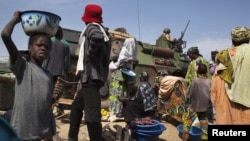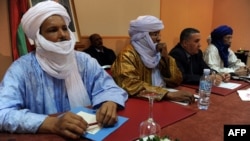A contingent of soldiers from Burkina Faso has deployed to central Mali, becoming the first African troops to link up with French and Malian forces fighting al-Qaida-linked Islamist militants.
Malian officials said Thursday about 150 soldiers from Burkina Faso had arrived in Markala, a town about 250 kilometers from the capital, Bamako.
VOA correspondent Idrissa Fall, who is in Bamako, says the soldiers are gathering near the base that French forces used to help re-take the town of Diabaly.
Fall also says French forces conducted airstrikes late Wednesday against Islamist militants in Ansongo, in east-central Mali.
"The French planes began bombing Ansongo, targeting the office of customs and another office which is called public work(s), where the Islamists used to hide their materials. After the bombing, I think all the Islamists went hiding in the market, in the trees. There is panic inside the population but the city is calm today."
Fall reports soldiers from Niger are in camps near Mali's eastern border and a growing number of West African soldiers are arriving in Bamako.
Rebel split
In another development, a faction of one of the armed Islamist groups occupying northern Mali has announced it has broken away to form its own movement.
In a Thursday statement, a portion of the Ansar Dine rebel group said it had formed the Islamic Movement for Azawad. Fall says the newly formed group has expressed a willingness to seek a negotiated solution to the country's crisis.
"They condemned terrorism and say they are ready to fight against the terrorists. And, what is interesting is the guy who is leading the Islamic Movement for Azawad, Mr. Alghabass Ag Intallah, he is the son of the spiritual leader of the Tuareg and he was the closest aide of Iyad Ag Ghali, the leader of Ansar Dine," Fall reported.
In an interview Thursday with VOA's French to Africa service, Islamic Movement for Azawad spokesman Mohamed Ag Aharib explained why the group was created. He said there have always been "moderates" in Ansar Dine who condemned radicalism. Aharib said after Islamist militants launched attacks in southern Mali, the moderates decided they could not go further.
He also said the new movement is seeking autonomy for northern Mali, not independence.
Ansar Dine rebels joined with ethnic Tuaregs to seize control of northern Mali following a March coup. Ansar Dine and other Islamist groups then took full control of the region, where they have moved to impose strict Islamic law.
In late December, Ansar Dine agreed to a cease-fire with the government, but suspended it earlier this month, saying the government was not sincere about peace negotiations.
Rebel push
Islamist fighters began pushing south into government-controlled areas shortly after the new year, prompting airstrikes from French forces acting at the request of Mali's government to halt the advance. French and Malian troops have retaken some rebel-held areas.
Fall says there are significant changes in the northern city of Gao, which had been under the control of Islamist militants.
"Sharia is no longer in application in Gao because the Islamists, most of them, they’ve left the city. Now, women are going out with no veil and the younger people in Gao have begun smoking -- smoking cigarettes openly in the city of Gao," he explained. "When the Islamists were there it was forbidden to smoke. It was forbidden to listen to music. It was forbidden for women to go out without a veil. So, that is no longer in application because a big piece of the Islamists have disappeared from Gao."
In a related development, France has ordered special forces to protect a uranium site in neighboring Niger. Material from the Areva uranium mining site is used to help power France's nuclear power facilities.
Malian officials said Thursday about 150 soldiers from Burkina Faso had arrived in Markala, a town about 250 kilometers from the capital, Bamako.
VOA correspondent Idrissa Fall, who is in Bamako, says the soldiers are gathering near the base that French forces used to help re-take the town of Diabaly.
Fall also says French forces conducted airstrikes late Wednesday against Islamist militants in Ansongo, in east-central Mali.
"The French planes began bombing Ansongo, targeting the office of customs and another office which is called public work(s), where the Islamists used to hide their materials. After the bombing, I think all the Islamists went hiding in the market, in the trees. There is panic inside the population but the city is calm today."
Fall reports soldiers from Niger are in camps near Mali's eastern border and a growing number of West African soldiers are arriving in Bamako.
Rebel split
In another development, a faction of one of the armed Islamist groups occupying northern Mali has announced it has broken away to form its own movement.
In a Thursday statement, a portion of the Ansar Dine rebel group said it had formed the Islamic Movement for Azawad. Fall says the newly formed group has expressed a willingness to seek a negotiated solution to the country's crisis.
"They condemned terrorism and say they are ready to fight against the terrorists. And, what is interesting is the guy who is leading the Islamic Movement for Azawad, Mr. Alghabass Ag Intallah, he is the son of the spiritual leader of the Tuareg and he was the closest aide of Iyad Ag Ghali, the leader of Ansar Dine," Fall reported.
In an interview Thursday with VOA's French to Africa service, Islamic Movement for Azawad spokesman Mohamed Ag Aharib explained why the group was created. He said there have always been "moderates" in Ansar Dine who condemned radicalism. Aharib said after Islamist militants launched attacks in southern Mali, the moderates decided they could not go further.
He also said the new movement is seeking autonomy for northern Mali, not independence.
Ansar Dine rebels joined with ethnic Tuaregs to seize control of northern Mali following a March coup. Ansar Dine and other Islamist groups then took full control of the region, where they have moved to impose strict Islamic law.
In late December, Ansar Dine agreed to a cease-fire with the government, but suspended it earlier this month, saying the government was not sincere about peace negotiations.
Rebel push
Islamist fighters began pushing south into government-controlled areas shortly after the new year, prompting airstrikes from French forces acting at the request of Mali's government to halt the advance. French and Malian troops have retaken some rebel-held areas.
Fall says there are significant changes in the northern city of Gao, which had been under the control of Islamist militants.
"Sharia is no longer in application in Gao because the Islamists, most of them, they’ve left the city. Now, women are going out with no veil and the younger people in Gao have begun smoking -- smoking cigarettes openly in the city of Gao," he explained. "When the Islamists were there it was forbidden to smoke. It was forbidden to listen to music. It was forbidden for women to go out without a veil. So, that is no longer in application because a big piece of the Islamists have disappeared from Gao."
In a related development, France has ordered special forces to protect a uranium site in neighboring Niger. Material from the Areva uranium mining site is used to help power France's nuclear power facilities.






